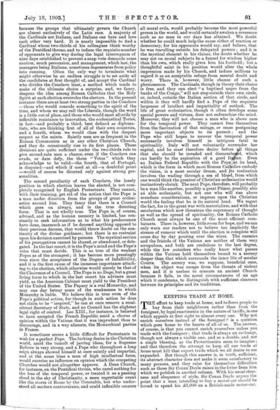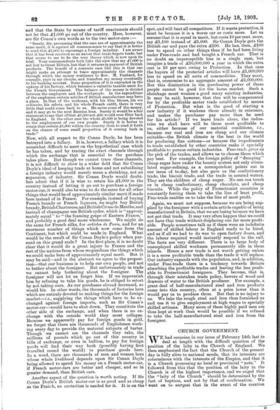SEEPING TRADE AT HOME. T HE effort to keep trade at
home, and to force people to buy from their neighbours rather than from the foreigner, by legal enactments in the nature of tariffs, is one which appeals at first sight to almost every one. Why not enrich ourselves instead of the foreigner ? is a question which goes home to the hearts of all of us. The answer, of course, is that you cannot enrich yourselves unless you trade with the foreigner ; that trade is always an exchange, though not always a visible one, and so a double and not a single blessing, as the Protectionists seem to imagine ; and that therefore the attempt to keep all our trade at home must kill that export trade which we all desire to see expanded. But though this answer is, in truth, sufficient, its abstract character does not make it seem satisfactory to many persons, and they raise for themselves difficulties such as those Sir Conan Doyle raises in the letter from him which we publish in another column. With his usual clear- ness and eloquence of style, Sir Conan Doyle argues the point that a man intending to buy a motor-car should be forced to spend his £1,000 on a British-made motor-car, and that the State by means of tariff enactments should not let that £1,000 go out of the country. Here, however, are Sir Conan's own words as to the two motor-cars :— " Surely, Sir, presuming that the cars are of approximately the same merit, it is against all common-sense to say that it is better to send this 41,000 to encourage a foreign industry. I am aware that it has been received as an axiom that trade begets trade, but that seems to me to be the very theory which is now upon its trial. Your correspondents both take the view that my 41,000 is not lost to Great Britain, but that it returns in payment of British products. The benefit of a concrete case like this is that one might make an attempt to trace approximately the channels through which the money continues to flow. M. Panhard, for example, pays in my amine, and transfers my money eventually to his banking account. Some proportion of it is expended in the upkeep of his factory, which becomes a valuable taxable asset for the French Government. The balance of the money is divided between the employers and the workpeople. In the expenditure of the employers certain articles of British manufacture may have a place. In that of the workman, with his blue blouse, his vin ordinaire, his sabots, and his whole French outfit, there is very little that could come back to us. He saves some of the money, and it may go to the next Russian loan. Surely it would be a fair statement to say that of that 41,000 not 420 would ever filter back to England. In the other case the whole 41,000 is being devoted to the employment of our own people. Surely it is better to retain that certain 41,000 within the country than to send it forth on the chance of some small proportion of it coming back in trade."
Now, with all respect to Sir Conan Doyle, he has been betrayed into a fallacy. It is, however, a fallacy which it is somewhat difficult to meet on the hypothetical case which he has taken, and by tracing the exact channels through which the exchange that is essential to the purchase takes place. But though we cannot trace these channels, it is not difficult to show in a wider field that Sir Conan Doyle's ideal of keeping trade at home and not subsidising a foreign industry would merely mean a shrinking, not an expansion, of industry. Sir Conan Doyle would doubt- ]ess admit that if it is wise to retain his 021,000 in the country instead of letting it go out to purchase a foreign motor-car, it would also be wise to do the same for all other things that would be of approximately similar merit if made here instead of in France. For example, instead of buying Prench brandy or French liqueurs, we might buy British brandy, British Chartreuse, and British Creme de Menthe, and instead of champagne use British cyder, which is "approxi- mately equal" to "the foaming grape of Eastern France," and probably a good deal more wholesome. We might do the same for French silks, for articles de Paris, and for an enormous number of things which now come from the Continent, but which could be made in England. What would be the result of Sir Conan Doyle's policy when pur- sued on this 'grand scale ? In the first place, it is no doubt clear that it would do a great injury to France and the rest of the nations from whom we purchase the things which we could make here of approximately equal merit. But it may be said—and in the abstract we agree to the proposi- tion—that our business is to help our own people, and not to bother about the foreigner. But unfortunately in trade we cannot help bothering about the foreigner. The foreigner will not let us forget him. If we impoverish him by refusing to take his goods, he is obliged to retort by not taking ours. As our purchases abroad decreased, so would his. In other words, the thousands of factories here which are entirely devoted to making things for the foreign market—i.e., supplying the things which have to be ex- changed against foreign imports, such as Sir Conan's motor-car—would have to shut down. They constitute the other side of the exchange, and when there is no ex- change with the outside world they must collapse. Because we apparently pay for foreign goods in gold, we forget that there are thousands of Englishmen work- ing every day to provide the material subjects of barter. Though we cannot see the channels they take, the millions of pounds which go out of this country in bills of exchange, or even in bullion, to pay for foreign goods will find their way back (possibly having first travelled, round the world) to purchase goods here.
In a word, there are thousands of men and women here whose whole livelihood depends upon Sir Conan Doyle being allowed to spend his money on a French motor-ear, if French motor-cars are better and cheaper, and so in greater demand, than British cars.
Another aspect of the question is worth noting. If Sir Conan Doyle's British motor-car is as good and as cheap as the French, no protection is needed for it. It is on the spot, and will beat all competitors. If it wants protection, it must be because it is a worse car or costs more. Let us assume that it is equal in merit, but costs 10 per cent. more, say £1,100 instead of £1,000. Sir Conan Doyle gets the British ear and pays the extra £100. He has, then, £100 less to spend on other things than if he had been living under Free-trade and had bought a French car. That is no doubt an imperceptible loss in a single case, but imagine a trade of £10,000,000 a year in which the extra cost is 10 per cent. owing to Protection. In that case the buyers of the protected articles will have £1,000,000 less to spend on all sorts of commodities. They must, that is, economise to an aggregate amount of £1,000,000. But this diminution in the purchasing power of these people cannot be good for the home market. Such a shrinkage must weaken a good many existing industries. It may be said, however, that this will be compensated for by the profitable motor trade established by means of Protection. But what is the good of starting a new industry if it weakens those already in existence, and makes the purchaser pay more than he need for his article ? If we leave trade alone, the indus- tries we shall have will be those most profitable to us, either because of our material conditions, i.e., because our coal and iron are cheap and our climate suitable—the British climate is the best in the world for producing fine cottons—or because the impediments to trade established by other countries make it specially profitable to pursue certain industries. Free-tradc gives us the pick of the trades, and allows us to choose those which pay best. For example, the foreign policy of " dumping " cheap sugar here under the bounty system not only stimu- lated sugar-refining, as a correspondent points out in our issue of to-day, but also gave us the confectionery trade, the biscuit trade, and the trade in aerated waters. They are the children of cheap sugar. No one can touch us in cheap confectionery, cheap chocolate, and cheap biscuits. While the policy of Protectionist countries is constantly forcing them to take the line of least profit, Free-trade enables us to take the line of most profit.
Again, we must not suppose, because we are beimg sup- plied by the foreigner with a certain article capable of being manufactured in Britain, that we are losing because we have not got that trade. It may very often happen that we could. not have that trade without displacing one far more profit- able. People sometimes talk as if there were an indefinite amount of skilled labour in England ready to be hired, and as if all we had to do was to open factory doors, and the labour required would instantly respond to the call. The facts are very different. There is no large body of unemployed skilled workmen permanently idle in these islands. Hence a new trade is not worth getting unless it is a more profitable trade than the trade it will replace. Our industry expands with the population, and, in addition, under Free-trade there is a tendency towards Britain absorbing the profitable trades and leaving the less profit- able to Protectionist foreigners. They become, that is, through their mistaken trade policy, hewers of wood and drawers of water to the British producer. For example, a great deal of half-manufactured steel and iron products come into this country, often at a price lower than it would pay us to produce them. But that is no injury to us. We take the rough steel and iron thus furnished us and use it to give employment at high wages to specially skilled artisans. Many more of these highly paid men are thus kept at work than would be possible if we refused to take the half-manufactured steel and iron from the foreigner.











































 Previous page
Previous page